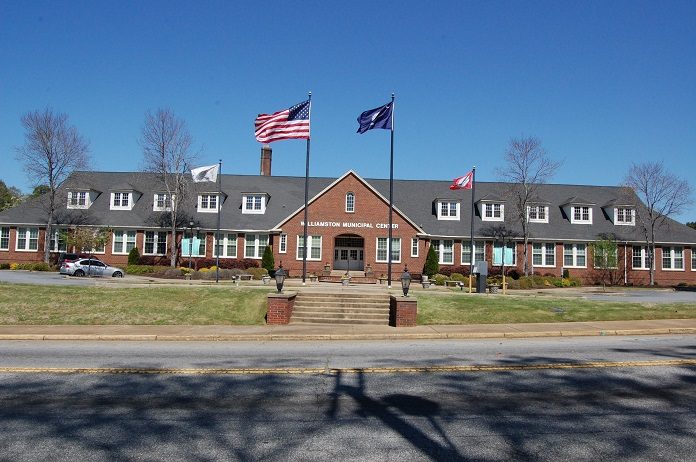By Stan Welch
Before starting the Williamston Town Council’s monthly work session, Mayor Rockey Burgess informed the group that the Ward Two candidate for the Council in the upcoming special election to fill Burgess’s now vacant council seat, Amanda Phillips, has withdrawn from the race. Burgess said Ms. Phillips had been promoted at her job, and the new duties made it impossible for her to serve on the Council at this time.
“She said that she thought the Council was doing a good job, and she wished us and the town well.” Her withdrawal leaves town attorney Lee Cole unopposed for the seat. The mayor pointed out that the search for a new town attorney would begin quickly. Cole, who was present in his professional capacity, demurred any acknowledgement of the likely result. “Let’s not count our chickens just yet,” he said.
The meeting then proceeded, with Burgess informing the Council that the Pelzer Heritage Commission, which has served for several years as the pass through organization for grants awarded to remove substandard housing in the area, has agreed to transfer four properties from that program to the town of Williamston. The four properties are as follows: 199 Minor Street; 201 Minor Street; 2 West Second Street; and 11 West First Street.
Burgess also listed three proposed ordinances that will be on the agenda at next week’s regular council meeting. One deals with the parking and storage of RVs and camping trailers on private property. The issue at hand is whether people are living in those locations. The planning commission apparently decided the threshold for such a determination would be based on the addition of permanent structures, such as a deck or a covering roof. The Council also discussed the possibility of adding an emergency short term exemption to the ordinance, to be granted due to severe weather or some other catastrophic event.
The second ordinance will establish the activities that can take place in the residential commercial zone. Essentially, explained attorney Cole, the change is to reconcile the existing office commercial zoning provisions with the new residential commercial provisions. The third ordinance will establish the legal guidelines for vendors at city events. Currently, there are very few such guidelines and restrictions in place.
Burgess also announced that the town will conduct a webinar event Saturday, as part of Black History Month. The event will be live streamed on the town’s Zoom account and on their YouTube page. “Our town has a rich history, and has had many significant African American citizens. Many of them are growing older, and we really need to secure their stories and histories while they are still with us,” said Burgess.
Finally, Burgess proposed to the Council that the town seek an asphalt ‘hot box’ that would enable the town’s road crew to keep hot mix asphalt pliable and usable for up to twenty four hours, in the event that weather interferes with the patching of potholes. He also announced that the stationary, fixed generator at the Brookdale lift station had completely failed, beyond repair. A new stationary generator would cost at least $60,000. Burgess located a portable generator, with a 125 kilowatt capacity; a generator capable of running the town hall and jail in an emergency, as well as operating the various sewer facilities in the town in an emergency.
Burgess stated that the portable generator, which had several thousand hours of use on it, cost $16,000. “I felt much better about that amount, especially in light of the much greater versatility of the unit.”

















